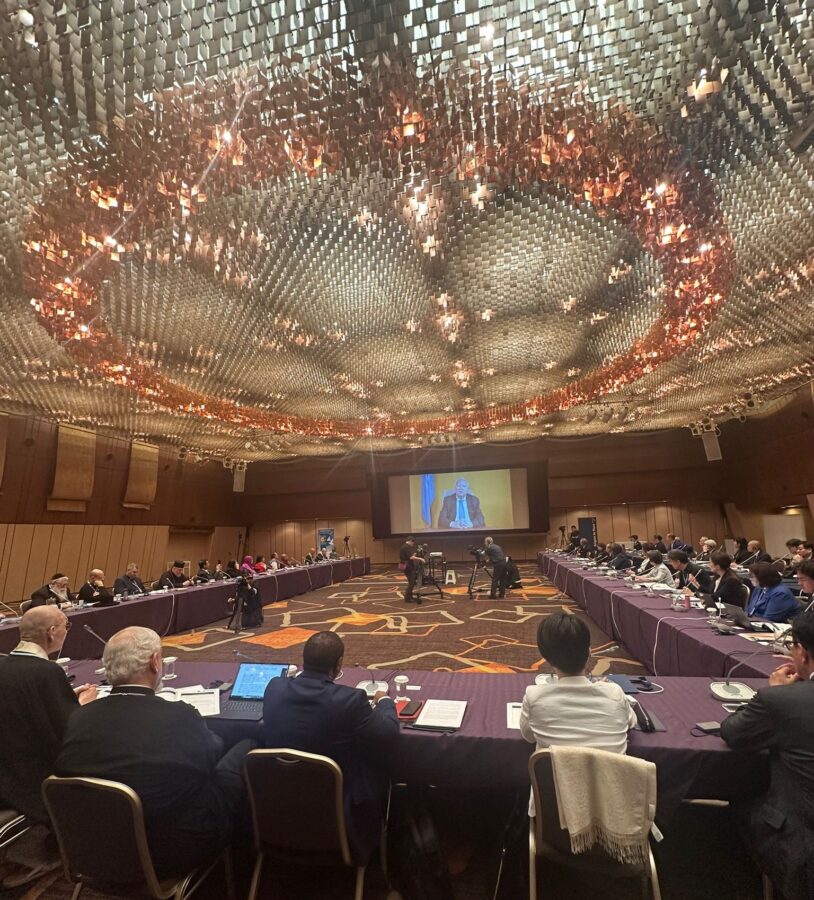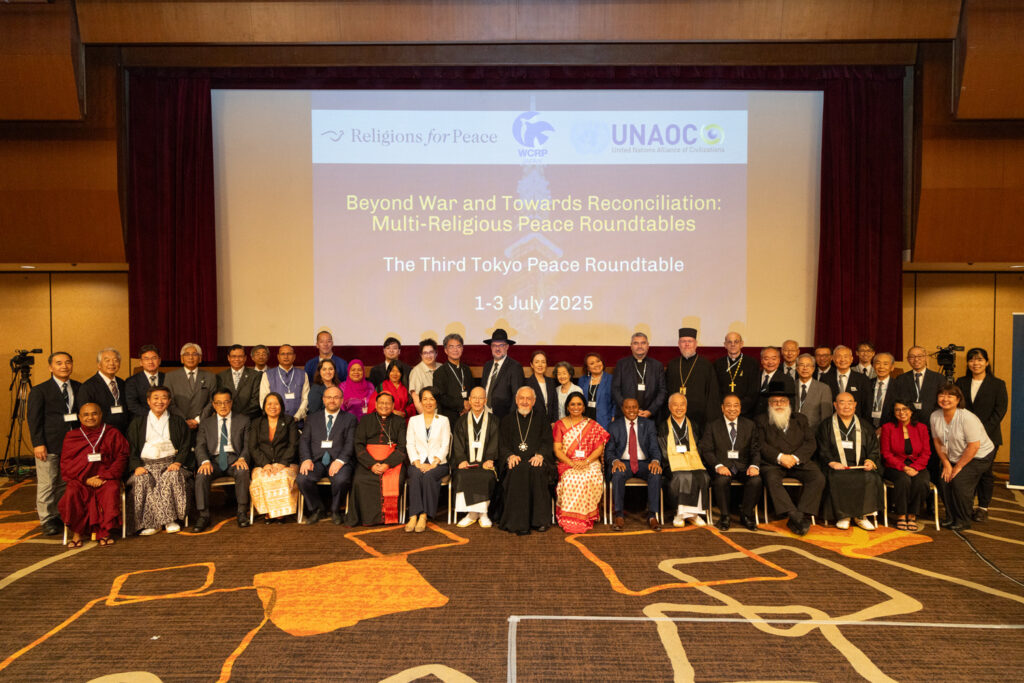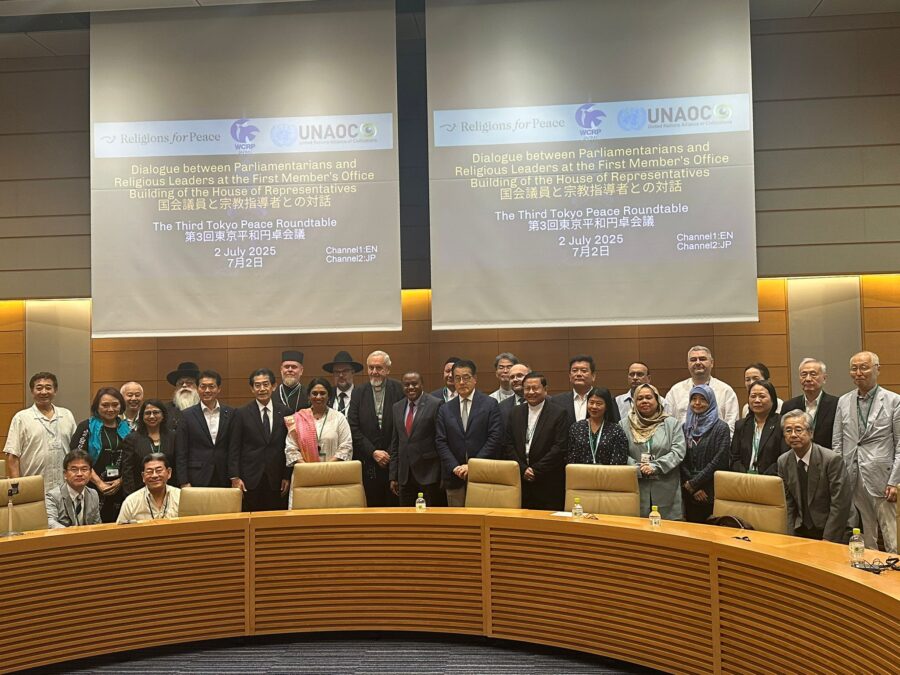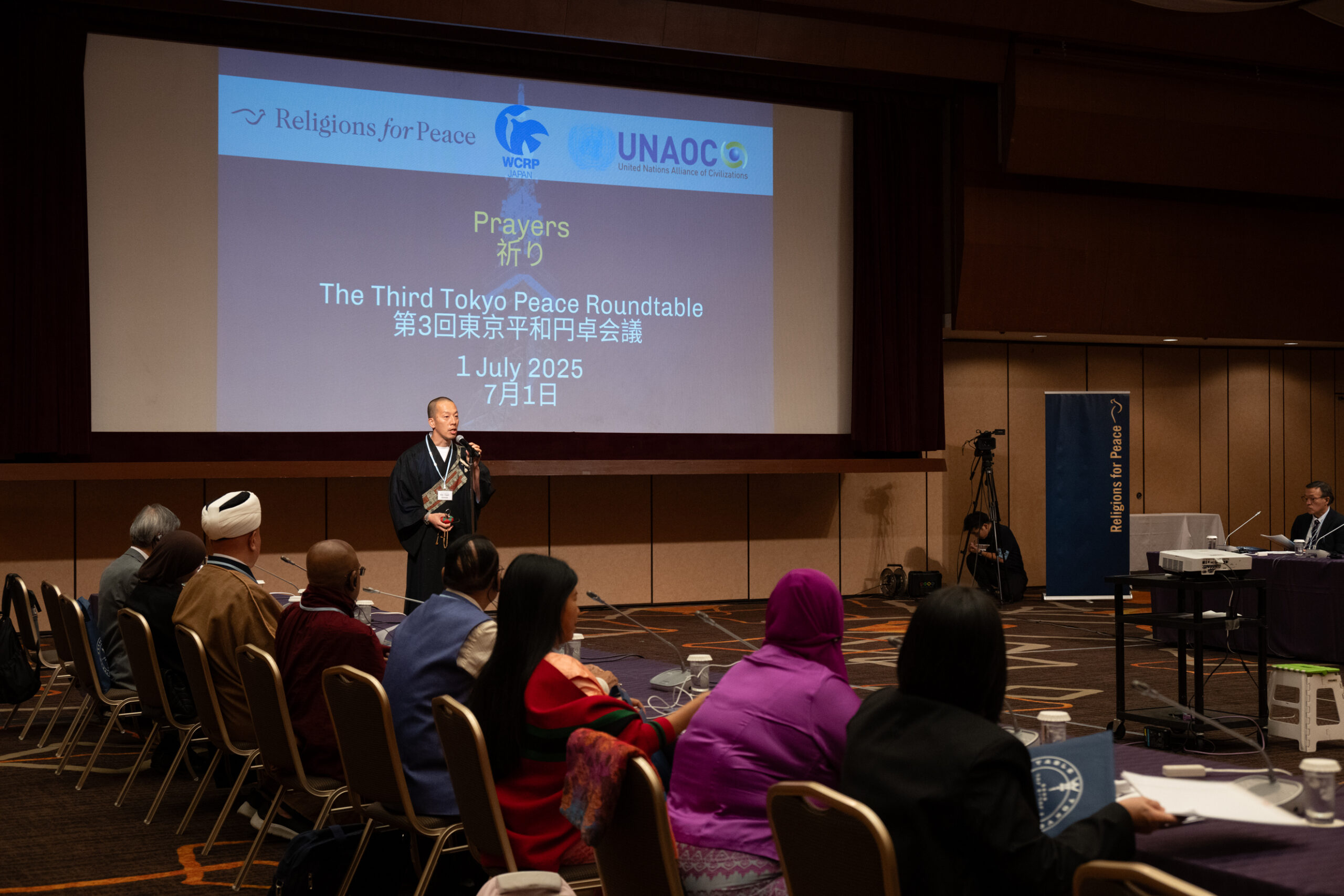Peace is possible. We, religious leaders, representatives of diverse faiths that include Buddhism, Christianity, Hinduism, Islam, Judaism, and Shintoism, coming from India, Israel, Japan, Kenya, Myanmar, Palestine, Russia, Spain, Türkiye, Ukraine, the United Arab Emirates, and the United States, came together in person and virtually for the Third Tokyo Peace Roundtable.

July 1, 2025. Third Tokio Peace Roundtable opening session
We hailed from different contexts, many of us from active war zones. Rooted in the sacred teachings of our diverse religions and faiths, we came together with a shared belief in our hearts that peace is possible. We convened to build trust, foster forgiveness and reconciliation, and further the collaborative Tokyo Peace Process.
We are deeply saddened by the suffering that people are undergoing in conflict zones around the world, in Ukraine and Russia, Israel and Palestine, Lebanon, Syria, Myanmar, Sudan, the Democratic Republic of Congo, Haiti and others, many of which have escalated since we last met for the Second Tokyo Peace Roundtable.
The interconnected nature of these crises – spanning armed conflict, displacement, food insecurity, climate emergencies, gender-based violence, and violence against children – requires a coordinated and inclusive global response. As advocates for and implementers of the Tokyo Peace Process, we stand as bridge-builders and peacemakers in this response, working to heal divisions and rebuild trust in communities torn apart by conflict.
We appreciate one another for the solidarity we have forged over the first two Tokyo Peace Roundtables, which has deepened during these three days. We extend our deep appreciation to our gracious host, Religions for Peace Japan, for bringing us together for this critical roundtable.
Drawing on the insights of the first and second Roundtables, we held honest, purposeful dialogues — praying, reflecting, building trust and fellowship as we explored possibilities to overcome conflict, by strengthening and leveraging multi-religious assets for peace, healing, and reconciliation. From the ashes of war and violence, we offered one another the chance to rise above, to emanate hope and compassion.

The 3rd Tokyo Peace Roundtable Conference, Opening Ceremony, Tokyo, July 1 2025
As religious leaders representing diverse faiths, we collectively affirm that:
- Religious leaders must act: Religious leaders around the globe serve as trusted moral influencers and respected guides. We therefore have a shared and sacred responsibility to teach and model peace and nonviolence to our congregations and communities. We must be harbingers of peace and a shared sacred wellbeing;
- Peace is possible: Peace is a desirable constant that we must all strive for, despite our differences and challenges. Our hope for this peace comes from our shared worldview, grounded in the sacred. A just peace founded on the sacred has at its bedrock, the virtues of mercy, compassion, and love and is devoid of superiority and domination;
- All life is sacred: All world religions hold human life and dignity sacred, and value the protection and preservation of our planet. Therefore, people and the planet, and all it encompasses, must be protected and cherished, recognising that all humans are entitled to basic rights and freedoms;
- Forgiveness is vital: Forgiveness, as we know from our sacred traditions, is neither simple nor quick. But violence can never be overcome by violence or hatred. Sustained, positive peace cannot be achieved without forgiveness and reconciliation, even towards those who have committed violence against us. This requires courage and demands trust. Religious leaders must embody the values of forgiveness and healing;
- Women are essential to building peace: True peace is impossible without the contribution of women and their wisdom at every stage of the peace process. Women must be brought to the peacebuilding table as initiators, strategists, and implementers, ensuring that their voices are not only heard, but sought out;
- Peace-making is not an avenue for profit: When a peace deal is contingent on financial gain, it is not true peace. When a reconciliation agreement includes profitmaking, it is not reconciliation. Just as war cannot be used for business, peace cannot be sought for profit.

July 2, 2025. Tokio Peace Roundtable’s participants meet with the representatives of Japanese Parliament
Keeping these sacred affirmations in mind, together we call for:
- Universal disarmament: Weapons—including nuclear, conventional, cyber weapons, and improvised explosive devices—encourage and abet violence. We are especially outraged by the continued use of banned, illegal weapons, including land mines and cluster munitions. We must uphold our collective responsibility to resolve disputes through peaceful means that preserve and protect the sanctity of life and human dignity. We must advocate for the resources that are used to create tools of death be channelled into life giving instruments;
- Protection of humanitarian aid channels: Humanitarian aid is essential to uphold human life and a necessary component to achieving peace. Channels for delivering aid must remain open and accessible, aid workers must be protected and enabled, and those seeking aid must not come to harm. The use of starvation as a weapon of war must cease, and food security must be prioritised;
- Respect for international law: The United Nations General Assembly has designated 2025 as the International Year of Peace and Trust. To foster this peace and trust, governments, civil society, and religious institutions and communities must respect and adhere to international laws as envisioned by the community of nations;
- Welcoming the other: The number of forcibly displaced people has nearly doubled over the past decade. With over 123 million people currently displaced, the need to care for refugees is more vital than ever. Our sacred texts teach that we must respect and protect the most vulnerable among us. Therefore, refugees and displaced and stateless peoples must be both welcomed and protected. Our focus was drawn to children in particular, whose childhood, health, and education is disrupted by displacement and the psychosocial impact of violence;
- Protecting places of worship: Holy sites and places of worship are the lifeblood of religious communities and are central to protecting freedom of religion and belief. Their destruction or damage amounts to a destruction of humanity and must cease. During the Second Tokyo Peace Roundtable, we called for their protection. However, their desecration has continued, making this declaration more vital than ever;
- Sustained multi-religious and multi-stakeholder collaboration: Religious and faith leaders are not peripheral to achieving peace—they are essential partners and co-owners of it. If we are to realise the true potential of interfaith, multi-stakeholder cooperation, and intergenerational dialogue, we must make room for everyone to build our common future.

Tokyo Peace Roundtable III, Moment of prayer. July 1, 2025
We herein advance the joint Tokyo Peace Process, a long-term action plan borne from these first three Roundtables. In the realisation of our multi-religious vision of peace, we commit to the following immediate and sustained collective actions:
Immediate
- Appealing for an unconditional indefinite ceasefire: Religious leaders, representing their respective institutions, jointly call for an immediate, unconditional, and indefinite ceasefire in Russia and Ukraine and all other war zones;
- Convening Israeli and Palestinian leaders: Although scheduled to attend the Third Tokyo Peace Roundtable, religious leaders from Israel and Palestine were unable to join us in person in light of the escalating conflict and closure of air space in the region. The loss of their presence emphasises the urgency of the Tokyo Peace Process. We will convene leaders from Israel and Palestine separately later this year, bringing them together to work towards reconciliation and contribute to this joint Process;
- Hosting a multi-religious youth peace exchange: Recognising the need to empower young people as agents of peace, we will implement and host a Multi-Religious Youth Peace Exchange of youth from affected areas. This exchange will seed the next generation of peacebuilders with the skills, networks, and vision to foster grassroots reconciliation. Young people will serve as vital members of the Tokyo Peace Process, represented at future roundtables;
- Advocating and galvanising for humanitarian aid: We will advocate to our governments, civil society, and international mechanisms, conveying the desperate need in our communities for prioritising humanitarian aid. We, too, will continue to work in our communities and with our congregations to provide humanitarian aid and shelter to those suffering from the effects of violence. We will make our holy places sanctuaries for the needy, and mobilise our networks to provide assistance. Specific responses to the plight of children is needed.
- Monitoring and response: We will conduct continuous conflict analysis, monitor developments in the field, and be flexible in our responses. We will regularly communicate with each other to learn from actions taken. Using our collective knowledge and insights, we will work to reshape the traditional media landscape in our communities and beyond to combat misinformation and distortion, uphold truth, and institute trust in our religious leaders and institutions;
- Champion forgiveness: We will advance forgiveness as an act of courage, rather than weakness. We will activate and build capacity for forgiveness and reconciliation as tools for peace by working with religious communities in the conflict zones of Ukraine-Russia, the Middle East, and Myanmar;
- Facilitating national dialogues: Utilising our shared knowledge and influence, we will create spaces and build capacity for national dialogue as peacebuilding processes, in countries where there are contestations and civil war;
- Advancing multi-stakeholder cooperation: We will work to cultivate a wide and diverse network of stakeholders from across religious institutions, governments, and civil society, including faith-based organisations. We will engage this ever-expanding network on joint initiatives and actions to foster sustained, positive peace.
As religious leaders, we extend our heartfelt prayers and steadfast solidarity to all those bearing the weight of ongoing war and violence, especially the most marginalised among us. We recognise that our actions must be future-thinking, to build a peaceful world with children at its centre. We reaffirm our commitment to unite across faiths in prayer and direct action, striving to build a culture of peace rooted in the sanctity of life, human dignity, and the pursuit of a shared sacred flourishing.
FINAL-STATEMENT
